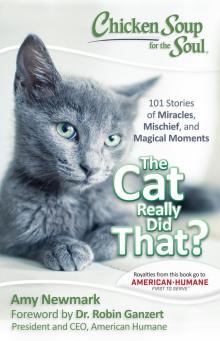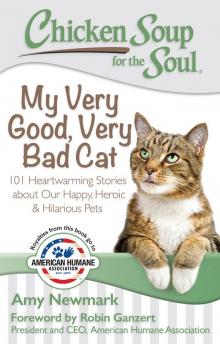- Home
- Amy Newmark
My Very Good, Very Bad Cat Page 3
My Very Good, Very Bad Cat Read online
Page 3
Karma would regularly chase me around my apartment and wrap around my ankle, biting and scratching until he drew blood. More than once, I would cower in the bathroom like Shelley Duvall from The Shining and see a furry paw clawing under the bathroom door. It was a reign of terror administered by a seven-pound mound of fluff. Of course, when Andrew would come to visit, Karma would leap into his arms and gaze adoringly at him. Between purrs, he would throw a sideways glance in my direction as if to say, “See? I am capable of great love. Just not for you. Ever.”
Despite Karma finding me despicable, I found him irresistible. He had emerald eyes, a pink nose, and a magnificent tail he held like a flag. He sported puffy tufts of fur around his legs so he looked like he was wearing bloomers. What woman hasn’t gone through a phase of loving a handsome bad boy, convincing herself that if only she loved him enough, he would change his ways?
Once Andrew and I married, I hoped that Karma would soften his stance against me. After all, we were a family now. He and Andrew were under the same roof again, and I could no longer be blamed for taking him away from his love.
No such luck. Karma reluctantly accepted me as his servant, but nothing more. He would wake me up in the morning by slapping my face with his paw and demanding his breakfast. He decided that water bowls were beneath him and instead took to waking me up in the middle of the night so that he could have a fountain drink from the bathroom sink. More often than not, he would finish slurping and then chase me back to bed, biting my ankles. I began to suspect that these late-night rituals were a sinister plot to exhaust me and hasten my demise. He was obviously playing the long game, and I had to grudgingly admire his persistence and cunning. I knew that if he ever learned how to operate a can opener, my days would be numbered.
“If something happens to me, it was Karma,” I warned a friend who happened to have Karma lounging on her lap at the time.
“Of course, it’s Karma. Karma will get us all. That is the beauty of the karmic wheel,” she replied, scratching Karma’s ears as he purred.
“No. I mean if I am snuffed out, it was the cat,” I insisted, pointing at Karma. “He’ll make it look like an accident, but I know it’ll be him. Remember this conversation if something happens to me.”
My friend scoffed and looked at the cat, who was innocently licking his paws, pretending he hadn’t just flashed me a dirty look moments before.
Perhaps I could be considered pathetic, continuing to hope that one day Karma would find it in his heart to love me, just a little. I tried to convince myself that I had enough love for the two of us. I grasped at any crumb he would toss my way: a look that was indifferent rather than pure loathing, the times that he let his paws touch my lap on his way to Andrew, his acknowledgment of my presence while he was waiting for me to fill his food dish. I still believed that I could win him over in time.
When Karma was around seventeen years old, he developed kidney problems. He became skinny and listless, his bony body feeling more like a fragile bird than a cat. I could hold his frail body on my chest and stroke his head, and he wouldn’t try to escape. That’s when I knew he was really sick. At that point, I would have given anything for him to give me a vicious scratch or bite. When we took him to the vet for his final injection, Andrew and I stayed with him, crying and stroking his fluffy bloomers until he closed his eyes.
It may seem strange that I could be broken hearted by the loss of a cat that never liked me. I still expect to see him trotting toward me when I use a can opener or wait to feel his sharp little teeth attacking my ankles when I get up in the middle of the night. At the time, a friend suggested that maybe I was heartbroken because now I knew I would never have a chance to win over the cat. I don’t think it was that. I think I finally understood that it was possible to love a crabby cat for who he was, not who I wished he could be. Our ability to love is bigger than we realize. Karma taught me that I could love without ego or expecting anything in return. Perhaps this was my Karmic lesson to learn, delivered in the form of a grudge-holding, glaring cat.
~Kristine Groskaufmanis
Junior
Fun fact: Some people believe that if you dream about a white cat, you’ll have good luck.
A white ball of fur, nails, and teeth was thrashing on top of the young dog that had foolishly wandered into our garage. My father tried to pry her off the poor canine, but all he got was scratches on his shoes and one on his leg. Junior wanted that dog gone right away. The dog managed to break free, blindly running out of the garage and across the road. He frantically disregarded any car that might have been driving on the asphalt because that danger was nothing compared to the white ball of insanity threatening to destroy him.
We had gotten the tiny, delicate kitten from a friend of my sister, who had commented that she looked just like her mother. This characteristic caused someone in my family to suggest we name her Junior, and the name stuck.
Junior grew to be a little smaller than an average cat, but her personality was that of a tiger. She hated dogs and only barely tolerated the two we had. Once in a while, she would attack the larger dog, and he would turn his face away and just try to get out of her way.
Whenever she saw a stranger dog, things got very interesting. She would sneak up and slowly make her way to the unsuspecting beast. She would then puff herself up until she looked five times her normal size. Then she would spring into action, and all we would see was a white flash of nails and teeth. When she was attacking a dog, she was unrecognizable as a cat. She looked like something out of this world, and that was her weapon. How can a dog fight something that looks like it was sent by the devil?
One time a client came by in his truck. As my father was talking to the man, his Blue Heeler jumped out of the cab and wandered about the yard. Junior spotted the dog. We saw her approaching and doing her dance, moving sideways and arching her back.
My father advised the man: “Watch out, that cat attacks dogs.”
The man responded, “Nah, my dog eats cats for breakfast.”
Just then, Junior sprang toward the dog and attacked. The poor dog did not know what to make of this white blur scratching at his face. He frantically escaped and retreated to the cab of the truck. Disappointed, the man exclaimed, “You big chicken!” Junior walked away to the back of the garage, still furious but proud of her accomplishment. The dog waited patiently in the truck while the client talked business with my father.
This happened several times to different dogs. Junior even attacked a blind dog. No kidding. Junior had no remorse for dogs that came into her territory.
She was also a next-level mouse hunter. When regular mice became too easy, too boring, she started bringing home prairie dogs. A prairie dog is prone to a ferocious self-defense, but once in a while, Junior would drag one of these guys home and offer it to us.
Not surprisingly, Junior had muscle tone that I have never seen on a cat. We noticed her muscles as she climbed the stairs, and my brother nicknamed her Sarah Connor after the fierce, muscular heroine in the Terminator movie we had recently watched.
Junior was not spayed. Despite Bob Barker’s efforts, no one I knew had their pets fixed in the rural southwest. I did not even know where a veterinarian could be found. Junior had a few litters and we managed to find homes for all of them. As her kittens grew into adulthood, we began to receive reports of those cats attacking dogs. She taught her kids well, and they became warriors in their own battles against the dog invasion force.
Although Junior was a vicious fighter, she was soft and gentle when interacting with her human friends. She loved to be petted, and she would occasionally sleep on my bed at night. When she was around, I felt strangely protected. When we played in the back yard, Junior was usually around but at a distance, as though she was watching over us.
We lost Junior during our family’s big move. She hated car rides, and halfway to our destination, she finally had enough. She broke free from her crate and squeezed out of my old pickup’s vent win
dow as we slept in a motel room. The next morning, we walked around the neighborhood next to the motel calling her. If she was there, she was not coming to our calls. After a few hours, my father decided that we needed to press on and let Junior be.
Two decades later, we still talk about Junior when the family conversation turns toward our furry friends. We remember her victories, we acknowledge her influence, we regret our separation far too soon, and we wonder how she made out in her new home. Maybe there is a family of dog-attacking warrior cats near that motel right now.
~Dan C.
Road Trip
Fun fact: Cats can make more than a hundred different sounds; dogs can only make about ten sounds.
After having nineteen cats over thirty-five years, we were done. No more cats. No more scooping, feeding, and feline traumas. Besides, we were going to winter in the sunny South. And you don’t want to drag a cat on a 1,200-mile car trip. We would be free as birds. On the trip to South Carolina we would talk about how cute our grandkids were, plot vacation escapades, and listen to quiet music or maybe a book on CD.
Then an orange-and-white stray cat trotted into our yard. For a few days, he meowed from a distance. So we left food out, which must have tasted better than dead mice because he wound around our ankles and let us pet him. In a week, he owned us.
The more we did for him — worming, de-fleaing and vaccinating — the more affectionate he became. Tucker even shrugged off being neutered. Instead of resenting us, he seemed to think we had rescued him from the man in the white smock. The only thing he hated was the car ride to the vet. During those fifteen minutes, he howled and tore at the cage like a Tasmanian devil.
Otherwise, Tucker was a baby. He cuddled on the couch with us and turned belly-up for stroking while he purred deeply with his eyes rolled back.
We advertised in the paper and begged friends and family to adopt this beautiful, housebroken, affectionate buddy who had all his medical bills pre-paid. We were leaving for three months and we needed to find him a home. But there were no takers, and we reluctantly admitted that we were embarking on cat number twenty.
When we left upstate New York for South Carolina at 5:00 a.m., it was dark, snowing and fifteen degrees. Tucker was in a huge cage that filled most of the back seat of our SUV. He would be fine with that much space, we told ourselves. He’d cry a bit, then settle down and sleep.
Not exactly. He howled; he gargled; he moaned. He clawed at the cage mesh and pushed his face into it until his nose was raw. The roads were slippery and snow was building up. We told him everything was okay. He didn’t buy it.
A half-hour later, he scratched at the small litter pan at one end of the cage, yanking it around. Kitty litter sprayed the back of my head. He squatted ten times and shifted targets. For ten miles, he fought for position. Finally, he was quiet. “That’s better,” I said.
Then the aroma hit. The car was really packed, so there was not much air inside, and most of that no longer qualified as air. “We’ve got to do something!” my wife pleaded. “I can’t breathe.”
I grunted so I didn’t have to open my mouth, but we were on a highway in blinding snow. It would be dangerous to park on the shoulder, so we slogged another seven miles at thirty-five miles per hour until the next exit. No services were open yet. In a parking lot, we discovered that Tucker had scattered kitty litter over everything except what it was supposed to cover, and that had, of course, missed the pan. The cage was a mess, and he had poo on his belly, tail and paws. While I clutched the frightened cat to my chest in the snow and wind, Carol cleaned him using paper towels and snow. Tucker’s tail was between his legs.
“He’s ashamed,” Carol said. “Poor thing!” When she finished with him, she worked on the cage, scraping what little litter was left to barely cover the bottom of the pan. Finally, she cleaned me up. “You better let me register at the hotel,” she said.
I returned him to the cage. “There can’t be any more in him,” I said. Wrong. “He can’t miss again.” Wrong. Between episodes, he dug at the cage and yowled, and somehow caught a claw in the back of the zipper and pulled it open. We didn’t know it until his head poked between us, eyes wide. “Let’s try him out of the cage,” I said. “It can’t be any worse.”
It wasn’t worse, just different. The howling subsided into meows. He roamed restlessly, shedding hair, crouching each time a tree whizzed past (and Kentucky has a lot of trees). He tried to leave through the windshield fifty times. He tried to push out through the passenger window. That worked out well because he stepped on the window-opening button so the glass slid down with a whoosh just as a semi passed us in six lanes of traffic. We all flinched at the sudden roar and rush of air. I fumbled to raise the glass. Luckily, the noise scared Tucker, who dove for the back seat.
We were congratulating ourselves on a close one when a window behind us whizzed down. He’d done it again! Carol lunged for him, grabbing his tail to keep him from jumping out while I pulled up the window button, unable to see where he was and afraid I might decapitate him. I set the childproof window locks and then the door locks for good measure. How could I be so out of practice? I thought fondly of the days we crammed our back seat full of children for vacations and only had to deal with feet kicking our backs and voices whining, “Are we there yet?”
“Are we there yet?” Carol asked.
By southern Kentucky, he began to calm down. Oh, he still shed furiously, so we breathed an atmosphere that consisted of oxygen and fur soup. All three of us sneezed our way through Tennessee. But he began to nap between escape attempts. Eventually, he sat upright on the console between Carol and me and stared ahead like a regular passenger. I think he decided we had all been abducted by this four-wheeled beast, and we’d all escape together somehow. He stared at us and made gentle meows as if to ask if we had figured out a plan yet.
Finally, he curled his fifteen-pound body on my lap for a long, undisturbed pet and nap. You know how draining long drives are, how dopey they make you? Not this one. By the time we arrived, I was ready to climb a mountain or dig the Panama Canal. The clock said it took us eighteen hours instead of our usual sixteen. But the time had rocketed past like a two-hour action movie. It was a good thing we had three months before the return trip.
~Garrett Bauman
Little Monsters
Fun fact: A cat’s hissing often sounds like a snake, and some researchers believe cats may have developed this distinct sound by imitating snakes they encountered in the wild.
I was a Navy brat growing up, which meant my father was assigned to a new duty station every few years. Until the age of five, my younger brother and I lived in the suburbs. When our dad was sent to a rural area in upstate Maine, our parents were determined to show us what country living was about.
Dad searched high and low for the perfect house, but was unable to find one that met his “countrified” requirements. Then, purely by accident, he came across an old farmhouse set on several acres of land with a barn, a huge garden plot, and a pond.
We were in our new home a few months when Dad came home from work one day with a cardboard box in his hands. We could hear mewling sounds coming from inside the box.
“What in the world have you brought home?” my mother asked.
My father, lover of all things lost and forgotten, told us how a co-worker’s cat had given birth to a litter of kittens. She found homes for all of them except two and was on her way to take the final pair to the local pound when Dad offered to adopt them.
One look inside the box was all it took for my brother and me to instantly fall in love. The kittens were adorable. One was pure black with four white socks, and the other was a mixture of black, browns, and grays. I chose the black one and named her, predictably, Fluffy. My brother chose the other and named him, of all names, Dirty Face.
Mom was not as thrilled, but we begged, and the cats stayed.
And so began the love-hate relationship between the cats and our mother. It was as if th
ose two critters could sense her initial reluctance at them being there, and they made sure she knew they never forgot it.
It started out innocently enough. The wooden legs on the kitchen table became their scratching posts, and they had that dining set looking like something from a salvage yard in no time. They also shredded two sets of sheer drapes my mother made for the living room.
When they got older, they would leave little treasures for her on the back stoop, things like dead mice and moles and small birds. Fluffy and Dirty Face were not easily deterred, however. If they couldn’t find any prey outside, they would take easy pickings from inside the house.
As a special treat for our dad’s birthday, Mom was defrosting a pair of T-bone steaks and a couple of lobsters in the kitchen sink. That afternoon, we ran errands with her. When we got back, the steaks and lobsters were gone. We searched everywhere for the missing birthday menu items, but couldn’t find them. We couldn’t find the cats either. A few hours later, my brother yelled from upstairs that he had found Fluffy and Dirty Face. They were stretched out under my brother’s bed on the hardwood floor, their bellies swollen to an alarming size with the remains of their stolen booty scattered around them. Apparently, the T-bones were not to their liking. The lobsters were a different story. To this day, I have never seen a pair of lobsters picked so clean.
While both cats seemed to take particular delight in terrorizing our mother, Fluffy was the more aggressive. About the worst Dirty Face would do was pounce from dark corners and scare her, but Fluffy clearly had a more adventurous streak.
The final straw came one evening when my mother drew a hot bubble bath and told us not to disturb her. Apparently, Fluffy didn’t get the memo. Mom was soaking in the tub, unaware the cat had somehow managed to climb the outside trellis and squeeze in through the open bathroom window holding a small green snake, still alive, in its mouth. My mother heard a soft plop and opened her eyes to find Fluffy perched on the rim of the tub.

 Chicken Soup for the Soul
Chicken Soup for the Soul The Joy of Less
The Joy of Less Hope & Miracles
Hope & Miracles The Cat Really Did That?: 101 Stories of Miracles, Mischief and Magical Moments
The Cat Really Did That?: 101 Stories of Miracles, Mischief and Magical Moments The Joy of Christmas
The Joy of Christmas My Very Good, Very Bad Dog
My Very Good, Very Bad Dog My Very Good, Very Bad Cat
My Very Good, Very Bad Cat